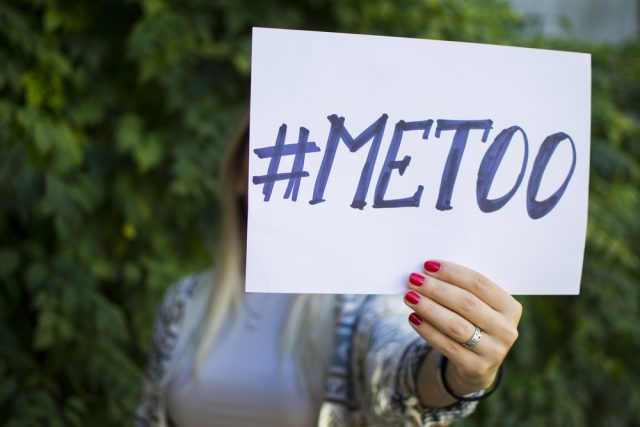 Maybe it’s because it’s awards-show season. Maybe it’s because the media embraces victims more easily when they are gorgeous A-list stars. Either way, movements like #MeToo and #TimesUp – as well as sexual harassment more generally—have become unfairly conflated with the women of Hollywood. As a result, there are disproportionately more debates over what this producer or that actor knew about Harvey Weinstein than there are over what it’s like for women in regular, everyday workplaces. The not-so-breaking news is that sexual harassment happens just as often in workplaces that do not include sound stages and trailers as in those that do. But seriously, it’s time for us to look behind the movie sets and see what’s happening in the world of ordinary, non-movie star sexual harassment.
Maybe it’s because it’s awards-show season. Maybe it’s because the media embraces victims more easily when they are gorgeous A-list stars. Either way, movements like #MeToo and #TimesUp – as well as sexual harassment more generally—have become unfairly conflated with the women of Hollywood. As a result, there are disproportionately more debates over what this producer or that actor knew about Harvey Weinstein than there are over what it’s like for women in regular, everyday workplaces. The not-so-breaking news is that sexual harassment happens just as often in workplaces that do not include sound stages and trailers as in those that do. But seriously, it’s time for us to look behind the movie sets and see what’s happening in the world of ordinary, non-movie star sexual harassment.
Last week, a federal jury in New York awarded a historic $13.4 million dollar verdict to sexual harassment plaintiff Rosanna Mayo-Coleman. Mayo-Coleman is a storeroom attendant at a sugar refinery owned by American Sugar Holding, Inc. (the parent of Domino Sugar). She is part of a union workforce in which she is one of just a few women among over 150 men. After working for the company for twenty years, Mayo-Coleman’s new manager allegedly began harassing her by commenting on her looks and soliciting her romantic attention. According to court documents, he made lewd comments, such as,“I would tap that ass if you wasn’t so old,” and, “I would tell you to go F yourself but you might go do it.”
When Mayo-Coleman rebuffed his advances, she found herself the victim of reported systematic discrimination. She was assigned more work, denied overtime, and even deprived of timely paychecks. After several years of enduring the unwanted advances and unfair retaliation, Mayo-Coleman hit her breaking point when she says her boss smacked her buttocks. She told him she planned to report him to human resources, and he allegedly laughed it off, saying,”they ain’t gonna do anything, they won’t even believe you. If you continue to report me, you know what is going to happen?” and then singing, “‘War, uh huh uh huh, war, uh huh uh huh. WAR.'”
As it turned out, Mayo-Coleman’s boss was right. The company didn’t do anything about it. That inaction became the crux of a lawsuit with both federal and state claims for harassment and discrimination. After hearing the evidence, the jury determined that Mayo-Coleman had been subjected to a hostile work environment and that American Sugar Holdings failed to prevent or correct the harassment by her supervisor. The finding came with a hefty price tag for the company’s nonfeasance — $1.7 million in compensatory damages and $11.7 million in punitive damages.
An award of that magnitude really should have been cause for massive media attention. Talking heads should have been proclaiming the verdict a sign of how #MeToo has impacted our justice system. Media should have held Rosanna Mayo-Coleman out as an example of a strong woman who fought the good fight and won against the corporate establishment. They certainly could also have pointed out that having a 59-year old black woman as a plaintiff in a sexual harassment case makes the victory even more meaningful. Hell, I’d have even have accepted some spirited debate over whether the verdict was proportional to the plaintiff’s suffering. But there was nothing.
Megan Goddard, lead counsel in the case, said of her client:
“Ms. Mayo-Coleman fought for her rights, and the rights of all women to work in a harassment free environment. Now, companies, public or privately-traded, are on notice that complaints of discrimination and harassment in the workplace must be taken seriously. Women like Rosanna are standing up for themselves and juries are responding.”
Goddard is right. Mayo-Coleman’s case is important, not only because its astronomical verdict is relevant to societal changes in a post-#MeToo world, but also because of the legal issues surrounding that verdict. In cases that involve this level of bad behavior by a defendant employer, such a verdict would certainly have a valuable deterrent effect – a result that goes to the core of Title VII’s purpose. Employers should not be permitted to weigh safe workplaces against their bottom line, or to treat legal settlements as a cost of doing business; they should suffer serious consequences if they fail to keep their employees safe.
However, there are statutory caps that apply to Title VII cases. These caps meant that the jury’s $11 million award for punitive damages will likely be reduced to just $300,000– an amount that feels a lot less like a life-changing windfall. Mayo-Coleman will still be allowed to recoup her $1.7 million in compensatory damages, as well as any damages for violations of New York state law, which have no corresponding cap.
Does federal law have it right? Should we be guarding against sky-high verdicts in sexual harassment cases? Or does New York State have it right? Perhaps employers should fear limitless judgments. Bottom line, this is what we should be debating – not whether Salma, Annabella, or Ashley seemed the most sincere.
This is an opinion piece. The views expressed in this article are those of just the author.